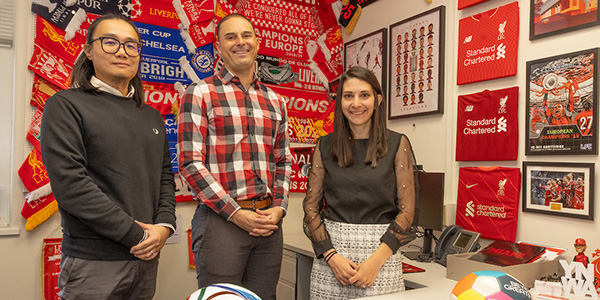Miami faculty, students help Mexico prepare for 2026 FIFA World Cup
Miami-Mexico City collaboration empowers future sport professionals ahead of 2026 FIFA World Cup hosting

Miami faculty, students help Mexico prepare for 2026 FIFA World Cup
When associate professor of Sport Leadership and Management Adam Beissel read the proposal from the Diplomacy Lab at Miami in spring 2025, his reaction was “Oh, this is tailor-made for us.” The proposal aligned with his research expertise — geopolitics of sports, the hosting of international sport events, and the cultural and political economy of international sport mega events — so he submitted an application to work on it.
He is working alongside associate teaching professor of Sport Leadership and Management Chelsea Meyers, who is teaching the SLM 414 Facility and Event Management course that anchors the project, and assistant professor of Sport Leadership and Management Ryan Chen, who will develop evaluation tools to measure the students’ growth and assess their readiness to contribute to Mexico’s sports sector.
The Diplomacy Lab is a public-private research partnership between the U.S. Department of State and more than 60 domestic academic institutions with the goal of conducting research on pressing policy issues. The United States, Mexico, and Canada will co-host the 2026 FIFA World Cup, presenting an opportunity to strengthen economic ties and diplomatic relationships between the U.S. and Mexico. In partnership with the United States Embassy in Mexico City and Universidad YMCA Mexico, Miami students will work with their YMCA counterparts throughout the semester.
The research project, titled “Empowering the Next Generation of Sport Professionals,” is currently underway as part of Meyers’s course. Miami students will help YMCA students majoring in Technology Education (most of whom do not have a background in sport or event management) with technical English for sports, major event management, event operations, crisis management, and sports marketing. Throughout the semester, the students will meet to discuss the delivery of international sport mega events and prepare an end-of-semester project developing criteria for policy recommendations to ensure positive, sustainable, and long-lasting impacts on the community and businesses of Mexico City.
By better positioning YMCA students to deliver the 2026 FIFA World Cup, the goal is to improve the safety, stability, and prosperity of not only visitors, but also the local community, and create viable career opportunities for the students during and after the event.
Meyers’s 400-level course is facilitating the intercultural exchange and ensuring deliverables. Chen will develop a pre- and post-survey evaluation to measure the changes in the students’ knowledge, skills, and abilities and then analyze the data results to assess their readiness to contribute to the growth and professionalism of Mexico’s sports sector. Based on the results and the students’ end-of-semester projects, the three faculty members will work together to generate a report summarizing key findings and provide evidence-based policy recommendations for successful hosting of the 2026 FIFA World Cup.
“What we dreamed up was this cross-cultural shared experience around delivering an international sport mega event,” Beissel explained about creating the specifications of the project. “What are the social, political, and economic impacts of hosting an event like this? How can Mexico City, the people and businesses that are there, truly benefit from the hosting of this global mega event that is going to have 1.5 to 2 billion spectators?”
“Coincidentally, all three of us are massive soccer fans, and so it really is a great alignment between our personal and professional interests,” Beissel said.
For Miami students, the project will be an opportunity for experiential learning, to navigate cultural differences and barriers to effectively collaborate, and to be involved in high-profile research with faculty members. It will also be an experience to reflect on in their careers regarding international sport business as some of the students will be leaders for these types of events in 10-20 years.
Beissel said he hopes this project could kickstart something that repeats each semester. With the Men’s World Cup next summer and the U.S. and Mexico to co-host the Women’s World Cup in 2031, shared cooperation and partnership will only grow, especially as North American sport leagues are now transcontinental. He added the project could also lead to external grant funding for additional research and the team would like to use the proposal for academic research to inform other academics in sports management programs of the benefits of a program like this.